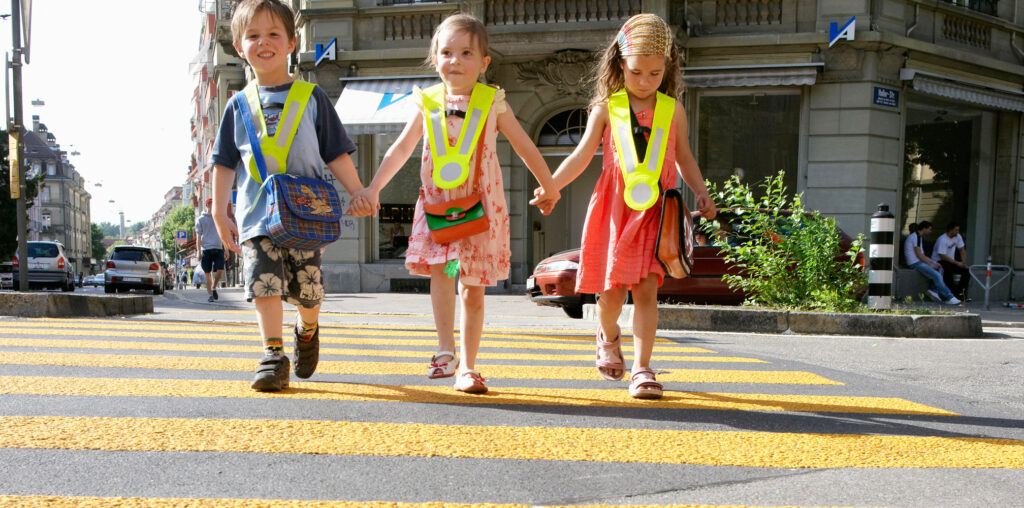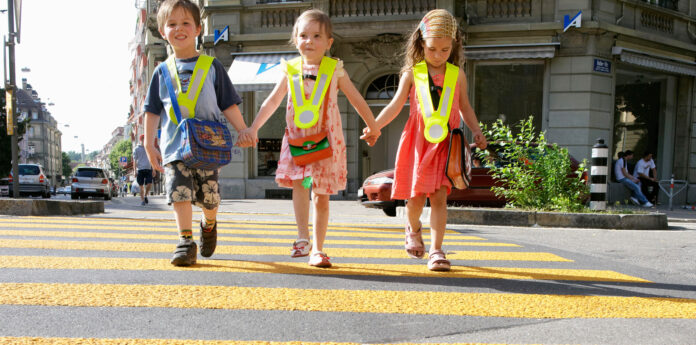Hana Hurábová has lived in Switzerland with her husband and three children since 2014. The eldest son is in the second grade, the middle one in kindergarten. “The children here are purposefully led to independence, they hammer nails and cut with a saw already in kindergarten. And they go to kindergarten alone without their parents. Our son has been walking alone since he was four and a half years old and we are not worried about him, even when he crosses a large intersection,” he says.
Our husband’s job took us to Switzerland – he is a purchasing manager in a Swiss company. I am a graduate economist, I worked in the field of human resources in the Czech Republic, now I am at home with my children

Language barrier
My eldest son started attending kindergarten two weeks after moving. He was five at the time and could only count to ten in German. He already had experience from a Czech kindergarten, so he knew roughly what to expect and so he had to deal “only” with the language barrier. But at that time, we had no idea that it would absorb two languages. There are four official languages in Switzerland (German, French, Italian and Romansh), but in everyday communication, the Swiss speak a dialect that is characteristic of the region. We live near Bern, so the dialect “bärndütsch” is spoken here. So my son had to struggle with German, and also with dialect. Fortunately, the children are doing it quickly – in just a few days he picked up the first words, gradually began to compose sentences and within a few months he was able to communicate easily.
He learned the dialect during a normal day in kindergarten, the teachers were really great and helped him a lot. He learned standard German once a week in the “Deutsch als Zweitsprache” (German as a second language) lesson, which children from non-German-speaking families have in kindergarten.
Although we live in a relatively small village, there is a large national mix, about a quarter of the native Swiss in the kindergarten. But surprisingly, Swiss children also take German classes, because in many families they speak the above-mentioned dialect at home, which is very far from standard German.
We have about 800 meters to the kindergarten, and even though it’s across the crossroads, I’m not worried about my son. Drivers give way at the crossing. In fact, all Swiss have been in this mode since they were little, so it seems normal to them.
My younger son was 2.5 years old at the time of our move. I started attending integration courses for mothers with children with him, which include babysitting. There, thanks to the amazing “Frau Lydia”, he learned the dialect completely painlessly, and when he started kindergarten two years later, he didn’t have such a language handicap as his older brother.
Compulsory two years before school
Preschool is compulsory in Switzerland two years before the start of school. Children are assigned to catchment kindergartens and schools according to their place of residence. Before entering kindergarten, they can attend paid preschool facilities, which are similar to Czech private kindergartens and nurseries. Children of working parents have priority placement here.
However, many mothers stay at home with their children or work part-time, because the “classic” kindergarten has a very different time regime than we know from the Czech Republic. The morning starts at 8:20 a.m. and ends at 11:50 a.m. Once a week, children also have afternoon classes from 1:30 p.m. to 3:15 p.m. There are no lunches in the kindergarten, the children go home for them. Alternatively, it is possible to pay for the so-called Tagesschule, which is something like a club. There the children get lunch and stay until their parents pick them up in the afternoon.
Sawing and hammering nails
The Swiss kindergarten is also a non-violent preparation for school – children learn letters and counting in the form of a game, do graphomotor exercises, learn about days, months and seasons. Of course, they also play. Interestingly, each of the children has to decide in the morning which activity they want to do that day. Then they pin a peg with their name to the activity – you can choose from drawing, modeling, board games, puzzles, building blocks, and so on. Then there is a snack and after that we work on “projects” on the topic that is current in the given period.
Many mothers stay at home with their children, or work part-time because kindergarten ends before noon.
In each activity, the goal is the psychomotor development of children as well as manual dexterity, including sawing and hammering nails. Every day, everyone goes to the garden for a while, in any weather. In addition, they often go to the forest for the whole morning, where their parents can accompany them if they have time. Children also go to the school gym to exercise and the older ones visit the library.
Independence above all else
There is a huge emphasis on the independence of the children. They are led to start going to kindergarten sooner or later alone or with friends. Before that happens, they undergo “training” with a police officer who instructs them on how to cross the road and so on. They will also receive reflective tapes.
Our younger son started going to kindergarten on his own when he was about four and a half. We have about 800 meters to go, and even though it’s across the intersection, I’m not worried about it. Drivers give way at the crossing here. In fact, all Swiss have been in this mode since they were little, so it seems normal to them. Children from the next village also come to our school. Most of them normally ride to school alone on their bikes, in any weather. Every year at the beginning of the school year, children have lessons on bicycles on a traffic playground, and from about the fourth grade they train under the supervision of police officers directly in live traffic.
Do not underestimate anything
Children’s abilities are evaluated already in kindergarten. About halfway through the school year, there is an individual meeting with the teacher (without the presence of the child), where they discuss how they are doing with maturity. Parents will thus get information on how their child behaves in the kindergarten, how they cooperate, what they are good at in terms of their development and what they are not, what needs to be worked on.





